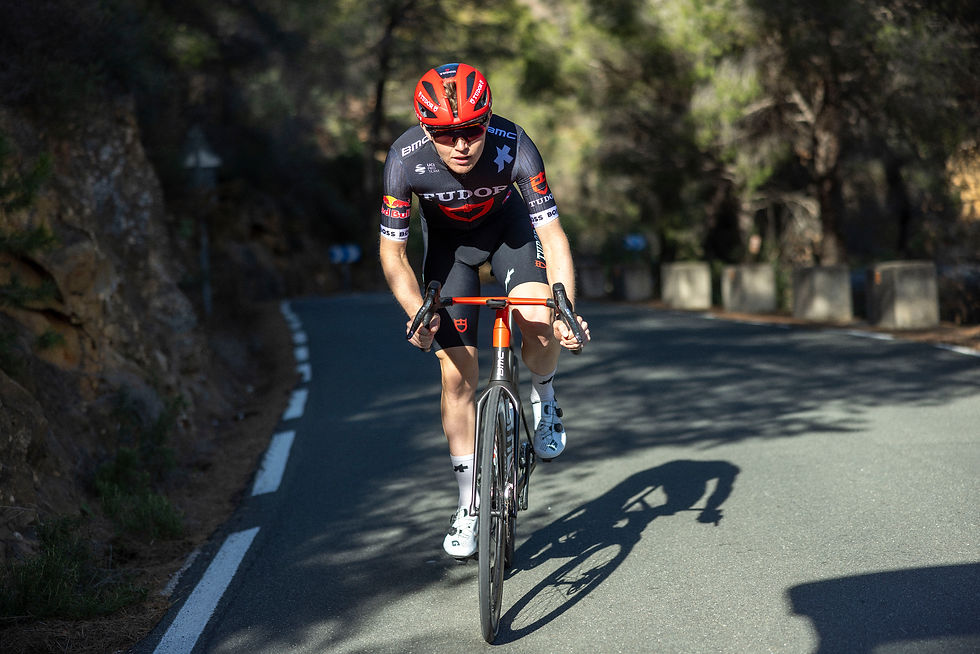"A Healthier Athlete Is Also A Faster Athlete"
- socials555
- Feb 14
- 4 min read
An Interview with Michael Storer about plant-based nutrition

This article is part of the third issue of Musette Magazine . Michael Storer will make his 2025 debut at UAE Tour next week (17 - 23 February) with ambitions for the General Classification.
Can a professional athlete balance high-performance nutrition with the environmental impact of food production? The answer is yes, and Michael Storer, a 1997-born athlete from Perth, Australia, is a great example. He has been following a plant-based diet for several years, showing that even top athletes can adopt this lifestyle successfully.

Michael, can you explain what a “plant-based diet” is?
A plant-based diet emphasizes foods derived from plants, such as fruits, vegetables, nuts, seeds, and whole grains, but doesn’t necessarily exclude animal products. On the other hand, a vegan diet avoids all animal products. I follow a plant-based diet, meaning about 99% of what I eat is vegan, but I believe in staying flexible.
When and why did you transition to a vegan diet?
I became more aware of the topic in 2017 when I was 20 and had just moved to Italy. I began cutting back on meat gradually. After watching documentaries and reading reports about the environmental impact of animal agriculture, I made the final switch in 2019, eliminating chicken and most fish from my diet.
Did you make this change during or between seasons?
I actually made the switch during the Vuelta a España. A former teammate, Robert Power, was pescatarian, and the chef had already been preparing meals for him. I asked if I could join him, and they accommodated my request.
How did your cooking change when you returned home?
The team dietician gave me some guidance, but it was quite simple. Almost every dish can be made plant-based using vegan alternatives like tofu, tempeh, vegan sausages, or seitan. Since my wife was already on a plant-based diet, it was easy to make the transition at home.
Did you learn anything new?
I was surprised by how much protein you can get from vegan sources and products.
Did you notice any changes in your body or performance?
It’s hard to say, but I did notice that my weight became more stable and my cholesterol, both total and LDL, dropped to safer levels within three months. In terms of performance, I never felt any decline, and there’s growing evidence that a vegan diet is healthier for the heart and overall mortality.
“A healthier athlete is a faster athlete, as they say. ”
Do you take any special supplements?
I take vegan Omega-3 made from seaweed because fish get their Omega-3 from eating algae. Mussels and oysters are also sustainable sources. Besides that, I take iron depending on the season and Vitamin D in the winter.
Does your diet change when you're at races?
It’s easier when we have a chef cooking for us, as they prepare vegan meals for me. When there’s no chef, the team ensures I get something through the hotel, or I use a food box filled with dried fruits and other products. If eating vegan becomes too difficult during races, I prioritize getting the nutrients I need for performance.
What’s your typical race day diet?
In the morning, I have a large bowl of soy milk with cereal and fruit. During the race, I use MNSTRY vegan bars and gels. Afterward, I drink a recovery shake made with soy milk and powder, followed by a carb- and protein-rich meal prepared by the chef or bus driver. Dinner is similar, with a nutritious meal before bed.
Do you have a favorite non-vegan dish you miss?
It depends on what I’m craving. When dining out, I choose based on what I like, as eating at a restaurant is about enjoying the experience. Sometimes I’ll have a Fiorentina steak, sushi, or a Neapolitan pizza with mozzarella di bufala. Food is also tied to culture, and I believe it’s important to enjoy traditional dishes—many of which are plant-based without people realizing it.
What’s your favorite vegan recipe?
I’d say baba ganoush—eggplant, tahini, olive oil, lemon juice, and garlic—or a marinara pizza. I get a lot of inspiration from Cucina Botanica, an Italian influencer who shares vegan recipes on social media.

How do you talk about plant-based diets with family, friends, and colleagues?
I’m always happy to discuss plant-based diets with anyone who’s interested, but I don’t push my views on others. My brother went vegan at the same time as I did, and my mom changed her diet when she saw the health benefits. In cycling, I’ve met other riders who follow plant-based diets, like Simon Geschke when we were on the Team Sunweb together. Nowadays, I’d say at least one rider on every team eats plant-based, and many say they eat very little meat at home.
What advice would you give to people considering a plant-based diet?
For professional athletes, it’s important to be smart about any diet change and work with performance staff like team doctors and dieticians to monitor health. For the general public, consulting a qualified dietician is crucial, rather than relying on social media or influencers. From my experience, switching to a plant-based diet has been a positive change, and I believe it’s something many people could consider for their health and the planet’s well-being.
More stories can be read in Musette Magazine. The Tudor Pro Cycling magazine gives an insight into the activities of Sette Sports in cycling.
